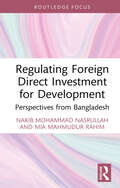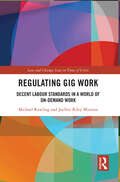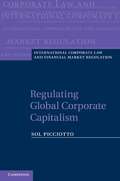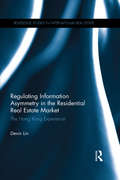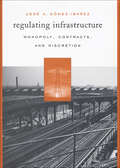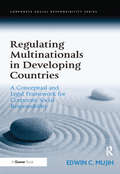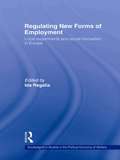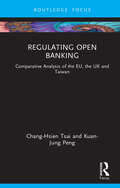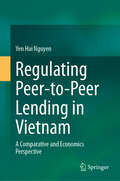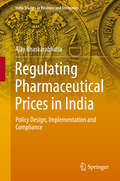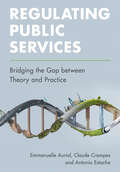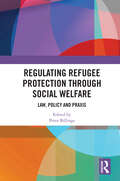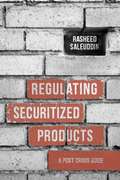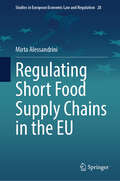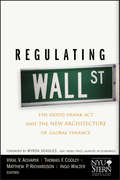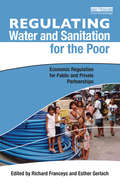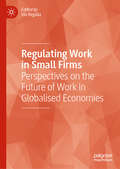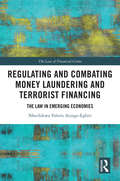- Table View
- List View
Regulating Financial Innovation: Fintech and the Information Deficit (EBI Studies in Banking and Capital Markets Law)
by Christopher RuofThis book explores the impact of 'Fintech' on the information asymmetry between the financial regulator and the markets. It details the growing regulatory mismatch and how Fintech exacerbates the “pacing problem”, where the regulator struggles to keep up with innovation. With information as a point of reference, the book adds a new perspective on the latest phenomenon in financial innovation and presents a novel framework for navigating structural changes in the financial sector. Based on this analysis, a number of proposals to reduce the information gap and avoid regulatory mismatch are discussed. Thereby, new and promising regulatory concepts, such as regulatory sandboxes and SupTech applications are also covered. This book provides a practical framework for regulatory responses to financial innovation. It will be relevant to researchers and practitioners interested in financial technology and regulation.
Regulating Foreign Direct Investment for Development: Perspectives from Bangladesh (Routledge Focus on Environment and Sustainability)
by Mia Mahmudur Rahim Nakib Mohammad NasrullahThis book offers a comprehensive overview of the relationship between Foreign Direct Investment (FDI) regulation and sustainable development in Bangladesh.It is widely accepted that FDI-induced development is essential for the growth of undeveloped economies, but it can create a conflict between the investors' goal of profit maximisation and the host state's pursuit of economic gains. FDI-induced development is especially important for the economy of Bangladesh, the focus of this book, which argues that a balanced regulatory approach is necessary to ensure that FDI benefits all stakeholders. In examining Bangladesh's FDI regulatory regime, the authors reveal that it is investor-centric and lacks a development-oriented approach. They discuss the relevant laws, practices, mechanisms, and institutions that govern the entrance regulations and incentives for foreign investment, as well as the protection of the environment and human rights, with special attention to labour rights, involuntary displacement, and the protection of both the investors and the state in which they invest. From this analysis, the book recommends reforms to introduce development as a primary goal while maintaining Bangladesh's appeal as an FDI destination.The book will be of interest to researchers, students, and academics in the fields of economics, politics, sustainable development, and economic growth. It will also be of great interest to FDI strategists, policymakers, negotiators, administrators, and legislators in creating a balanced regulatory regime to attract FDIs for development.
Regulating Gig Work: Decent Labour Standards in a World of On-demand Work (Law and Change)
by Joellen Riley Munton Michael RawlingDigital revolution demands new approaches to regulating work. The “Uberisation of work” is not in reality a new phenomenon. It reintroduces the practices of ‘on demand’ engagement of labour common prior to the development of continuing employment. What is new, however, is the capacity of digital technology to engage labour in ways that avoid characterization as employment according to the legal tests developed in the 20th Century. This book tackles the challenge of ensuring that the emerging tribes of ‘gig’ workers in labour markets across the globe are afforded decent standards of work. This book discusses how to provide decent conditions and safe working standards for on demand workers engaged through digital platforms. It interrogates the rise of gig work, and the legal strategies that might be engaged to deal with the risk that on demand work will fall and remain outside of employment protections. It draws on observations of practices across the globe, but focuses particularly on regulatory solutions developed in Australia. The book will be a useful reference to policy making and legal reforms to address vulnerabilities of gig workers.
Regulating Global Corporate Capitalism
by Sol PicciottoThis analysis of how multi-level networked governance has superseded the liberal system of interdependent states focuses on the role of law in mediating power and shows how lawyers have shaped the main features of capitalism, especially the transnational corporation. It covers the main institutions regulating the world economy, including the World Bank, the IMF, the WTO and a myriad of other bodies, and introduces the reader to key regulatory arenas: corporate governance, competition policy, investment protection, anti-corruption rules, corporate codes and corporate liability, international taxation, avoidance and evasion and the campaign to combat them, the offshore finance system, international financial regulation and its contribution to the financial crisis, trade rules and their interaction with standards especially for food safety and environmental protection, the regulation of key services (telecommunications and finance), intellectual property and the tensions between exclusive private rights and emergent forms of common and collective property in knowledge.
Regulating Human Research: IRBs from Peer Review to Compliance Bureaucracy
by Sarah BabbInstitutional review boards (IRBs) are panels charged with protecting the rights of humans who participate in research studies ranging from biomedicine to social science. Regulating Human Research provides a fresh look at these influential and sometimes controversial boards, tracing their historic transformation from academic committees to compliance bureaucracies: non-governmental offices where specialized staff define and apply federal regulations. In opening the black box of contemporary IRB decision-making, author Sarah Babb argues that compliance bureaucracy is an adaptive response to the dynamics and dysfunctions of American governance. Yet this solution has had unforeseen consequences, including the rise of a profitable ethics review industry.
Regulating Information Asymmetry in the Residential Real Estate Market: The Hong Kong Experience (Routledge Studies in International Real Estate)
by Devin LinThis book conducts a detailed examination of the current form of the Hong Kong residential property regulatory system: the 2013 Residential Properties (Firsthand Sales) Ordinance (Cap 621). The author sheds light on how the new legislation promotes a number of values including information symmetry, consumer protection, the free market and business efficacy. It provides a detailed account of how the regulatory mechanism has evolved over the past three decades to catch unconsscionable sales tactics (such as selective information and/or misrepresentation of location, size, completion date and past transactions) and monitor sales practices in order to protect the interests of stakeholders in this ever-changing first-hand residential property market. This book breaks down this complicated subject matter by focusing a number of chapters each on a specific attribute of the residential property on sale. It then examines the various channels through which the information is communicated to the prospective buyer and discusses misrepresentation of the key information in sales of residential properties as criminal liability.The tension between consumer’s rights on one hand and the pursuit of free market principles on the other is but one example of the conflicting values thoroughly discussed in the book, others include superstition vs. modernization and clarity vs. flexibility. Aimed at those with an interest in consumer protection and transparency-orientated legislation in commercialized real estate transactions, this book seeks to provide an in-depth discussion of the latest trends and directions of travel.
Regulating Infrastructure: Monopoly, Contracts, and Discretion
by José A. Gómez-IbáñezThis wide-ranging study of urban infrastructure &“offers a series of fascinating arguments&” in favor of market-oriented approaches to regulation (Times Higher Education Supplement). In the 1980s and &‘90s, many countries turned to the private sector to provide infrastructure and utilities—such as gas, telephones, and highways—with the idea that market-based incentives would control costs and improve the quality of essential services. But high-profile failures have since raised troubling questions about privatization. This book addresses one of the most vexing of these: how can government fairly and effectively regulate &“natural monopolies&”—those infrastructure and utility services whose technologies make competition impractical? Mapping out various approaches to regulation, José Gómez-Ibáñez draws on a wealth of case studies, as well as history, politics, and economics. He makes a strong case for favoring market-oriented and contractual approaches over those that grant more discretion to government regulators. He shows how contracts can provide stronger protection for infrastructure customers and suppliers—and greater opportunities to tailor services to their mutual advantage. At the same time, he highlights scenarios where alternative schemes may be needed.
Regulating Investor Protection under EU Law: The Unbridgeable Gaps with the U.S. and the Way Forward
by Antonio MarcacciThis book analyzes the legal system for the protection of retail investors under the European Union law of investment services. It identifies the regulatory leitmotiv driving the EU lawmaker and ascertains whether and to what extent such a system is self-sufficient, using a set of EU-made and EU-enforced rules that is essentially different and autonomous from the domestic legal orders. In this regard, the book takes a double perspective: comparative and intra-firm. Given the federal dimension of the US legal system and, thus, the “role-model” it plays vis-à-vis the EU, the book compares the two systems. To fully highlight the existing gaps and measure how self-sufficient the EU system is against its American counterpart, the Union/Federal level as such is analyzed – i.e., detached from the national (in EU terms) and State (in US terms) level. Regulating Investor Protection under EU Law also showcases the unique intra-firm perspective from a European investment firm and analyzes how EU-produced public-law rules become a set of compliance requirements for investment services providers. This “within-the-firm” angle gauges the self-sufficiency of the EU system of retail investor protection from the standpoint of an EU-regulated entity. The book is intended for both compliance professionals and academic scholars interested in this topic while also including illustrative sections intended to provide a broader regulatory view for less-experienced readers.
Regulating Long-Term Care Quality
by Anna Maresso Vincent Mor Tiziana LeoneThe number of elderly people relying on formal long-term care services is dramatically increasing year after year, and the challenge of ensuring the quality and financial stability of care provision is one faced by governments in both the developed and developing world. This edited book is the first to provide a comprehensive international survey of long-term care provision and regulation, built around a series of case studies from Europe, North America and Asia. The analytical framework allows the different approaches that countries have adopted to be compared side by side and readers are encouraged to consider which quality assurance approaches might best meet their own country's needs. Wider issues underpinning the need to regulate the quality of long-term care are also discussed. This timely book is a valuable resource for policymakers working in the health care sector, researchers and students taking graduate courses on health policy and management.
Regulating Multinationals in Developing Countries: A Conceptual and Legal Framework for Corporate Social Responsibility (Corporate Social Responsibility)
by Edwin MujihEdwin Mujih explores the difficulties associated with regulating multinational companies operating in developing countries, with a particular focus on extractive industries. The author highlights the need to establish an international legally binding framework to ensure that multinationals operate in a socially responsible manner to protect local communities and the environment. Edwin Mujih’s analysis reveals that the existing mechanisms for controlling the behaviour of huge multinational entities are of normative force only, that these are particularly inadequate, and that the notion of corporate social responsibility is only meaningful where behaviour can be legally regulated. Regulating Multinationals in Developing Countries features a study of the Chad and Cameroon Oil and pipeline project, which highlights the problems arising in countries that have neither the capacity nor the will to effectively regulate those operating within their borders. The author has evaluated compliance by the parties with their social and environmental obligations. He has found that, despite controversy surrounding inadequate regulation of this project in its incipient stages, the system that was put in place following huge opposition from the affected communities and from NGOs is worthy of attention and could stand as a model for similar projects elsewhere. This first title in Gower's Corporate Social Responsibility Series to approach CSR from a legal perspective provides insight not just into the complexity surrounding efforts to regulate multinationals operating in countries with weak regulatory regimes, but also into the fundamental nature of multinational corporations and the debate about different notions of CSR itself.
Regulating New Forms of Employment: Local Experiments and Social Innovation in Europe (Routledge Studies in the Political Economy of the Welfare State)
by Ida RegaliaUsing a comparative framework, this new volume focuses on how non-standard employment can be regulated in very different social, political and institutional settings. After surveying these new forms of work and the new demands for labour-market regulation, the authors identify possible solutions among local-level actors and provide a detailed analysis of how firms assess the advantages and disadvantages of flexible forms of employment. The authors provide six detailed case studies to examine the successes and failures of experimental approaches and social innovation in various regions in the UK, France, Germany, Italy and Spain.
Regulating Open Banking: Comparative Analysis of the EU, the UK and Taiwan (Routledge Research in Finance and Banking Law)
by Chang-Hsien Tsai Kuan-Jung PengFinTech transformations have brought changes to the global financial markets and merit the attention of financial regulators across jurisdictions. This book is one of the first ones of its kind to look at open banking (OB). It examines regulatory approaches to OB by taking a broad view of comparative legal systems and through perspectives of transaction costs, public choice, and institutional design. The book looks at the legal implications by engaging in a two-tiered comparative analysis: comparing between compulsory and voluntary approaches to OB policies and comparing the legal systems between the West (i.e., the EU and the UK) and an Asian economy (i.e., Taiwan).
Regulating Peer-to-Peer Lending in Vietnam: A Comparative and Economics Perspective
by Yen Hai NguyenTechnological innovation has been a major catalyst for the financial sector's progression, leading to the emergence of peer-to-peer (P2P) lending as a novel source of small-scale funding. This book undertakes a comprehensive examination of the regulatory framework governing P2P lending in Vietnam, illuminating the diversification of risks inherent in this lending industry. While P2P lending is anticipated to address the credit gap and enhance financial inclusion in Vietnam, it concomitantly poses potential risks for all stakeholders. Utilizing fundamental economic tools, the book conducts a comprehensive analysis, demonstrating that apprehensions regarding these risks are not inflated. In the context of the Vietnamese government's endeavors to identify legal solutions to P2P lending operations, the book undertakes a comparative analysis of risk diversification strategies in micro- and/or small-sized financing schemes in Vietnam, the United States, and Japan. The book's proposed solution to mitigate risks for lenders in P2P lending through a collective funding scheme draws from legislative experiences in the United States and Japan, and it further explores how this innovative approach benefits borrowers and platform service providers, ensuring a balanced and secure lending environment. The book aims to contribute to the literature on regulatory practices for small finance in Vietnam and emerging markets, providing insights and practical solutions for effective regulation.
Regulating Pharmaceutical Prices in India: Policy Design, Implementation And Compliance (India Studies in Business and Economics)
by Ajay BhaskarabhatlaThis book presents an extensive study on the effectiveness of recent regulations on pharmaceutical prices in India, exploring the weaknesses in the design and implementation of pharmaceutical price controls and investigating what can be done to fix the broken system.In addition, it examines the extent to which essential medicines are actually made affordable by price controls. The book argues that companies make the pharmaceutical price control regime largely ineffective by coordinating to increase pre-regulation prices; by diversifying horizontally away from the regulated markets and increasing prices in the unregulated markets; by manipulating trade margins; and by refusing to comply with the regulation because the penalties remains negligible.The book draws on extensive empirical research involving India’s 2013 Drug Price Control Order and widely-used medicines such as paracetamol and metformin to illustrate how firms have weakened regulation. It argues that the regulatory regime can be strengthened by using systematic analysis of product- and region-level data in the Indian pharmaceutical industry, and by screening for the strategies that firms currently employ to circumvent regulation. In closing, it discusses recent efforts to strengthen the implementation of price controls in India and expanding the scope of price controls to medical devices.
Regulating Private Military Companies: Conflicts of Law, History and Governance
by Katerina GalaiThis work examines the ability of existing and evolving PMC regulation to adequately control private force, and it challenges the capacity of international law to deliver accountability in the event of private military company (PMC) misconduct. From medieval to early modern history, private soldiers dominated the military realm and were fundamental to the waging of wars until the rise of a national citizen army. Today, PMCs are again a significant force, performing various security, logistics, and strategy functions across the world. Unlike mercenaries or any other form of irregular force, PMCs acquired a corporate legal personality, a legitimising status that alters the governance model of today. Drawing on historical examples of different forms of governance, the relationship between neoliberal states and private military companies is conceptualised here as a form of a ‘shared governance'. It reflects states’ reliance on PMCs relinquishing a degree of their power and transferring certain functions to the private sector. As non-state actors grow in authority, wielding power, and making claims to legitimacy through self-regulation, other sources of law also become imaginable and relevant to enact regulation and invoke responsibility.
Regulating Public Services: Bridging the Gap between Theory and Practice
by Antonio Estache Emmanuelle Auriol Claude CrampesRegulation is one of the tools used by governments to control monopolistic behaviour in the provision of public services such as electricity, transport or water. Technological and financial innovations have changed these public services markets since the 1990s, bringing new regulatory challenges, including technological and financial ones. This book demonstrates that basic regulatory theory and tools can address these new challenges, in addition to more traditional regulatory issues, both in developed and developing economies. The theory covered in the book is robust enough to guide regulators in multiple contexts, including those resulting from the effects of financial or political constraints, evolving market structures or the need to adapt to institutional weaknesses, climate change and poverty concerns that demand regulatory intervention. A bridge between theory and an evolving global practice, this book mobilizes the lessons of the past to analyse the future of economic regulation.
Regulating Radio in the Age of Broadcasting
by David A. Moss Colin Donovan Marc CampasanoWhen the Titanic tragically sank on April 15, 1912, potentially life-saving help was delayed as a result of failures in radio communication. In part as a result, Congress moved swiftly to regulate radio, passing the Radio Act of 1912 four months later. Although at this stage radio was still used principally for point-to-point, Morse code communications, the radio scene changed drastically in the early 1920s with the rise of broadcasting, as new private stations began to deliver music and voice programs to a listening public. By 1927, more than 700 stations were battling over 96 available frequencies. This crowding of the broadcast spectrum substantially diminished the quality of radio listening. In fact, the airwaves were so full of interference that many citizens complained that it was often impossible to tune into any station clearly. In January 1926, both houses of Congress began considering sweeping bills to tackle the problem of interference and the question of how to allocate frequencies for broadcasting. Lawmakers vigorously debated a broad set of issues, ranging from questions of ownership and regulatory authority to the protection of free speech and the prevention of monopoly. A bill endorsed by both the House and Senate emerged a little over a year later, after the interference problem was said to have grown worse, and it finally arrived on the desk of President Calvin Coolidge on February 23, 1927. The bill would create a Federal Radio Commission with the power to license radio stations for two years at a time. President Coolidge had endorsed radio reform in his most recent annual message to Congress but had requested that all regulatory power be granted to the secretary of commerce, not to a commission. Now, with Congress having opted for a commission, he had to decide if the bill before him charted an acceptable path for American radio regulation.
Regulating Refugee Protection Through Social Welfare: Law, Policy and Praxis
by Peter BillingsThis book analyses the use and abuse of social welfare as a means of border control for asylum seekers and refugees in Australia. Offering an unparalleled critique of the regulation and deterrence of protection seekers via the denial or depletion of social welfare supports, the book includes contributions from legal scholars, social scientists, behavioural scientists, and philosophers, in tandem with the critical insights and knowledge supplied by refugees. It is organised in three parts, each framed by a commentary that serves as an introduction, as well as offering pertinent comparative perspectives from Europe. Part One comprises three chapters: a rights-based analysis of Australia’s ‘hostile environment’ for protection seekers; a searing critique of welfare policing of asylum seekers as ‘necropolitics’; and a unique philosophical perspective that grounds scrutiny of Australia’s policing of asylum seekers. Part Two contains five chapters that uncover and explore the lived experiences and adverse impacts of different social welfare restrictions for refugee protection seekers. Finally, the chapters in Part Three offer distinct views on human rights advocacy movements and methods, and the scope for resistance and change to the status quo. This book will appeal to an international, as well as an Australian, readership with interests in the areas of human rights, immigration and refugee law, social welfare law/policy, social work, and public health.
Regulating Securitized Products
by Rasheed SaleuddinSecuritization regulation remains, in the eyes of investors, banks, businesses, bureaucrats and politicians, one of the remaining unsolved puzzles of the post-Global Financial Crisis landscape. This book describes the key features of securitization, including the most common structures and their uses as well as the motivations of the participants in these markets. Important historical moments and case studies are frequently used to illustrate critical issues in the design and enforcement of regulation for securitized products. This work is intended to contextualize and contribute to the highly specialized debates between policymakers, regulators and the regulated financial intermediaries, setting out an agenda for discussion as well as providing some strongly held views on possible solutions. Written by an industry insider with over 20 years' experience in the markets, this book considers regulatory tools from all sides while avoiding common biases. It is a valuable source for not only regulators and policymakers, but also educators, students and researchers in financial regulation, financial engineering and investment management.
Regulating Short Food Supply Chains in the EU (Studies in European Economic Law and Regulation #28)
by Mirta AlessandriniThis volume presents a thorough analysis of the concept and role of Short Food Supply Chains (SFSCs) within the EU legal framework with a two-fold aim: first, it shows the pitfalls of the current legal scenario, which often limits alternatives rather than promoting them, and second, it provides a new conceptualisation for SFSCs under EU law by delineating and integrating all their distinctive features. Agricultural landscapes in the EU are now undergoing fundamental changes, revealing an increasing interest in SFSCs as a tool for promoting both local products and their food systems. Despite being the backbone of the EU agricultural system, SFSCs’ position in the current socioeconomic narrative has not been sufficiently fostered. In response, the book traces how SFSCs have historically been dealt with under the agricultural rules of the CAP, and to a much lesser extent, those relating to internal market food law, delving into the intricate relationship between agricultural and food law. The integration of these two disciplines into an agri-food law domain represented a pivotal shift in legal discourse, in particular in the context of SFSC regulation. The legal analysis extends its scope to encompass spatial and historical dimensions, enriching the contextual understanding of regulatory frameworks over time and across geographical boundaries. This new conceptualisation does not aim to establish a universal, ‘set-in-the-stone’ legal definition for SFSC applicable across disciplines. Rather, it seeks to identify common themes and key features among various SFSC initiatives. These themes serve as the foundation for determining a set of minimum legal requirements for the recognition and valorisation of SFSC initiatives at the EU level, which Member States can then tailor to their specific needs. The goal is to lay the groundwork for developing a concept that can be effectively operationalised across different sectors and geographical dimensions. The book makes a substantial contribution to the current academic debate, filling a significant gap in the existing CAP literature. On the one hand, it provides the first comprehensive and systematic analysis of all the measures that have addressed small farmers and SFSCs, from the CAP reforms up to the present day. On the other, by adopting a new multidisciplinary perspective encompassing legal, sociological, and agri-food studies, it raises new questions on the role of short supply chains in light of the Farm to Fork Strategy and beyond.
Regulating Wall Street
by Viral V. Acharya New York University Stern School of Business Matthew P. Richardson Myron Scholes Ingo Walter Thomas F. CooleyExperts from NYU Stern School of Business analyze new financial regulations and what they mean for the economyThe NYU Stern School of Business is one of the top business schools in the world thanks to the leading academics, researchers, and provocative thinkers who call it home. In Regulating Wall Street: The New Architecture of Global Finance, an impressive group of the Stern school's top authorities on finance combine their expertise in capital markets, risk management, banking, and derivatives to assess the strengths and weaknesses of new regulations in response to the recent global financial crisis.Summarizes key issues that regulatory reform should addressEvaluates the key components of regulatory reformProvides analysis of how the reforms will affect financial firms and markets, as well as the real economyThe U.S. Congress is on track to complete the most significant changes in financial regulation since the 1930s. Regulating Wall Street: The New Architecture of Global Finance discusses the impact these news laws will have on the U.S. and global financial architecture.
Regulating Water Security in Unconventional Oil and Gas (Water Security in a New World)
by Chad Staddon Regina M. Buono Elena López Gunn Jennifer McKayThis book addresses the need for deeper understanding of regulatory and policy regimes around the world in relation to the use of water for the production of ‘unconventional’ hydrocarbons, including shale gas, coal bed methane and tight oil, through hydraulic fracturing. Legal, policy, political and regulatory issues surrounding the use of water for hydraulic fracturing are present at every stage of operations. Operators and regulators must understand the legal, political and hydrological contexts of their surroundings, procure water for use in the fracturing and extraction processes, gain community cooperation or confront social resistance around water, collect flow back and produced water, and dispose of these wastewaters safely. By analysing and comparing different approaches to these issues from around the globe, this volume gleans insights into how policy, best practices and regulation may be developed to advance the interests of all stakeholders. While it is not always possible to easily transfer ‘good practice’ from one place to another, there is value in examining and understanding the components of different legal and regulatory regimes, as these may assist in the development of better regulatory law and policy for the rapidly growing unconventional energy sector.The book takes an interdisciplinary approach and includes chapters looking at water-energy nexus security in general, along with issue-focused and geographically-focused case studies written by scholars from around the world.Chapter topics, organized in conjunction with the stage of the shale gas production process upon which they touch, include the implications of hydraulic fracturing for agriculture, municipalities, and other stakeholders competing for water supplies; public opinion regarding use of water for hydraulic fracturing; potential conflicts between hydraulic fracturing and water as a human right; prevention of induced seismic activity, and the disposal or recycling of produced water. Several chapters also discuss implications of unconventional energy production for indigenous communities, particularly as regards sustainable water management. This volume will be of interest to scholars and students of energy and water, regulators and policymakers and operators interested in ensuring that they align with emergent best global practice.
Regulating Water and Sanitation for the Poor: Economic Regulation for Public and Private Partnerships
by Richard Franceys Esther GerlachThe aim of this book is to present the potential benefits as well as the challenges of introducing a more formal economic regulatory process into the urban water sector arena in lower-income countries. There is a particular focus upon the impact this may have on the poorest, the informal, slum and shanty dwellers of the rapidly growing cities. Economic regulation, usually introduced in the context of private operation of monopoly water supply, can deliver objectivity and transparency in the price-setting process for public as well as private providers. The book describes and analyses these issues through a consideration of ten country case studies. As a starting point, the current situation for the provision of water and sanitation services for the poorest through non-regulated public providers in India and Uganda is reviewed. Comparative chapters are then presented on Ghana, Philippines, Bolivia, Jordan, Zambia and Indonesia, all with varying degrees of private sector involvement and regulation. Finally the experiences of two richer countries are considered - Chile and England, countries with the longest experience of economic regulation and the 'most privatized' suppliers. In all cases there is a focus on the very necessary role of customer involvement in price-setting and service monitoring and on the role of alternative (private) service providers.
Regulating Work in Small Firms: Perspectives on the Future of Work in Globalised Economies
by Ida RegaliaExploring the diversity of small firms, this contributed volume focuses on the crucial topic of work and the ways in which it is regulated, and offers reflections on the future of labour more generally. Traditionally managed through informal and adaptive processes, small firms allow us to understand the challenges and opportunities facing larger companies within an increasingly fragmented global production system. Analysing the case of Italy, a country characterised by a high number and wide variety of small firms, the authors draw on the results of a survey involving over 2,300 firms and face-to-face interviews with owner-managers working in 60 small and micro firms across several different sectors. Providing detailed analysis which will be useful for scholars of human resource management and small business, as well as managers, practitioners and policy-makers, the book enables a better understanding of the world of work in a globalised economy.
Regulating and Combating Money Laundering and Terrorist Financing: The Law in Emerging Economies (The Law of Financial Crime)
by Nkechikwu Valerie AzingeThis book analytically reviews the impact of the global anti-money laundering and counter-terrorist financing (AML/CFT) framework on the compliance trajectory of a number of jurisdictions to this framework. The work begins by examining the international financial sector reform and its evolution to inculcate the global framework for AML/CFT regulations. It challenges the resulting uniform AML/CFT due to its paradoxical impact on the compliance trajectory of African countries and emerging economies (ACs/EEs). This is done through an examination of the pre-conditions for effective regulation and compliance drivers for ACs/EEs that reveals the behavioural impact of the AML/CFT standards on the bloc of countries. Through the application of agency theory, it explores the relationship between ACs/EEs on the one hand and the international financial institutions that formulate, disseminate and facilitate compliance with the global framework for AML/CFT standards on the other. The remaining chapters review empirically the compliance pressures and resulting compliance trajectory of ACs/EEs with the AML/CFT standards. The final part of the book provides a detailed explanation of the compliance challenges of ACs/EEs and the legitimacy concerns that facilitate this. This book offers a new direction on the impact of global AML/CFT standards on ACs/EEs and contributes to the understanding of the conditions under which the global standards are likely to facilitate proactive compliance within these blocs of countries. As such it will be a valuable resource for academics, researchers and policy-makers working in this area.

